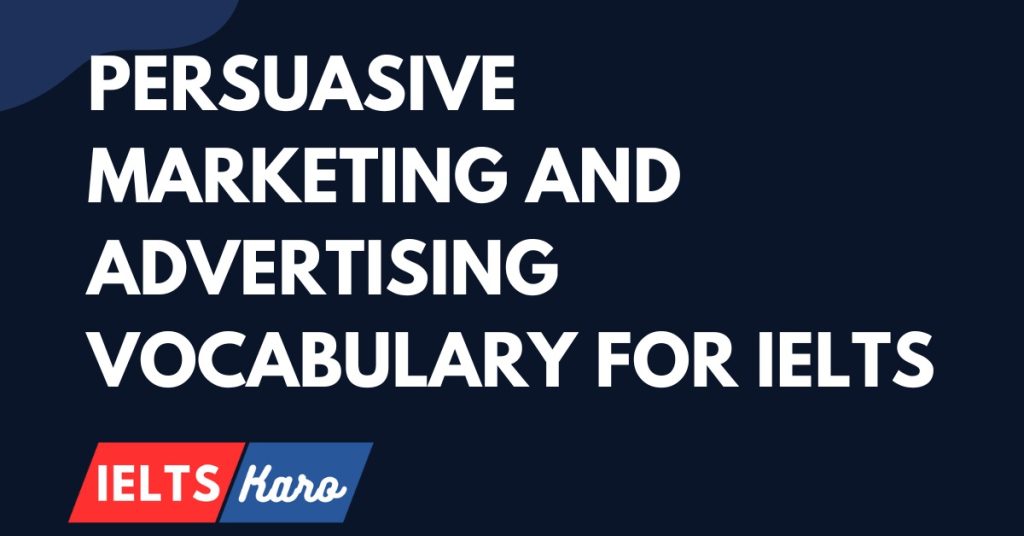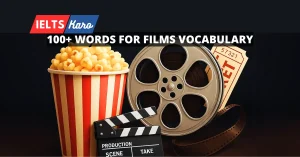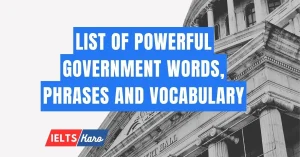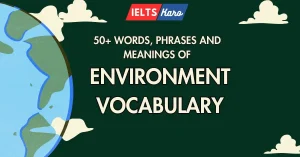Marketing and Advertising Vocabulary for IELTS
As a marketing professional and an IELTS trainer, I can assure you that having a strong grip over marketing and advertising vocabulary will give you a competitive advantage in your IELTS Speaking and Writing.
Moreover, understanding marketing and advertising vocabulary has significant importance, as many topics in Writing Task 2 and Speaking Part 2 and 3 are related to these. Once you go through the most common words, you can definitely improve your Reading and Writing band score.
Key Marketing and Advertising Vocabulary for IELTS
Words with Meanings – Definition and Examples
Here are some of the most common words on marketing and advertising with their definitions and examples:
- TV Commercial: A video advertisement played in between commercial breaks during dramas, movies and entertainment shows on the TV.
TV commercials are one of the main earnings of a news channel.
- Branding: The entire strategic process of identifying a target audience and defining an identity for a business, product and/or a service.
Branding is important if we want to make our business a huge success.
- Newspaper ads: A pictorial advertisement published in a newspaper, placed in local or international sections of the newspaper.
Newspaper ads are not yet outdated and they can generate a good return on investment for our business.
- Online ads: Ads that are placed online across multiple digital platforms and websites
We need to leverage online ads to increase our digital presence.
- Magazine ads: Ads that are placed in digital or print magazines.
We need to invest more in fashion magazine ads so that our brand reaches the right target audience.
- Direct Mail: Ads and marketing material sent directly to the customer’s mailing inbox at his/her postal address.
We are no longer pursuing direct mail, as customers are not looking at our message in their inboxes.
- Text messages: Short text messages sent directly to the customer’s mobile number.
Text messages are no longer an effective source of advertising for our business.
- Radio advertising: Ads and marketing messages played on the radio.
Last quarter, investment on radio advertising resulted in 15% growth of our revenues!
- Email advertising: Marketing that is done by sending direct emails to customers’ email accounts.
Email advertising is one of the best ways to grow our business online.
- Brochures: A marketing material that is a promotional document used to introduce a company and/or a new product or service.
We need to print more brochures and share with our customers for the launch of new products.
- Flyers: Similar to brochures, these are a slightly altered version.
How many flyers do we need printed for this week?
- Persuasive advertising: Advertising that persuades a customer to make a purchasing decision by appealing to their needs and demands, such as the launch of a new iPhone or a Samsung smartphone.
We need more investment in persuasive advertising to influence our customers’ buying decisions.
- Celebrity Endorsements: Ads and.or marketing material in which a company hires a renowned celebrity to push a marketing message to the target audience.
Celebrity endorsements are great, but our marketing budget does not allow us to spend a fortune on it.
- Digital Marketing: A form of marketing solely for online platforms and websites.
We need to use all digital marketing methods in order to increase our sales and reach online.
- Social Media Marketing: A form of digital marketing where the brand or company promotes their products or services across Facebook, Instagram, Youtube, Tiktok, Twitter (X) and other social media platforms.
We need to do proper social media marketing to reach millenials and Gen Zer’s
- Internet Pop-ups: These are ads that popup when you visit a website or any digital marketing platform. Although they are quite attention-grabbing in nature, they can many times be annoying to the user.
We need to rely less on internet pop-up advertising as it is quite annoying to our users.
- Buying Power: The financial capacity of a customer to purchase a product or service.
We should not raise the prices of our products because it can get out of our customers’ buying power.
Example Questions and Responses – Speaking Part 1
- Question: “Do you remember making a purchase of a product or service after seeing an advert for it?”
- Response: “Although I do not buy everything that I see in ads, sometimes, yes, I make purchases depending upon how good the advertisement is. Last time I bought something was online after seeing the ads for a kids’ t-shirt. I ended up buying a pair of t-shirts for my 2-year old boy and they were quite great in quality!”
- Question: “Do you remember any ads you saw while you were younger?”
- Response: “The ads I saw during my childhood days were really amazing, and one of them was an ad by Khaleej Times, a leading UAE-based newspaper. It featured Junaid Jamshed, who is no longer with us. The ad catapulted Khaleej Times into popularity.”
- Question: “Do you make a purchase based on celebrity endorsement?”
- Response: “No, I believe the sole purpose of buying products or services based on celebrity endorsements is not a good idea. For me, I only buy products that fit my needs and demands.”
- Question: “Do you believe that there is so much noise these days due to too many ads and marketing messages?”
- Response: “Over the last few years, there has definitely been an increase in the number of ads and marketing messages and it has contributed to reduced audience retention time. From billboards to TV commercials and social media ads, there are far too many these days than they were back in the early days of the internet.”
- Question: “Which platform is the most trustworthy for you for ads?”
- Response: “Social media marketing is the least trustworthy because anyone can run ads for less than $50. However, TV commercials and billboards are the most reliable ones.”
Example Questions and Responses – Speaking Part 2
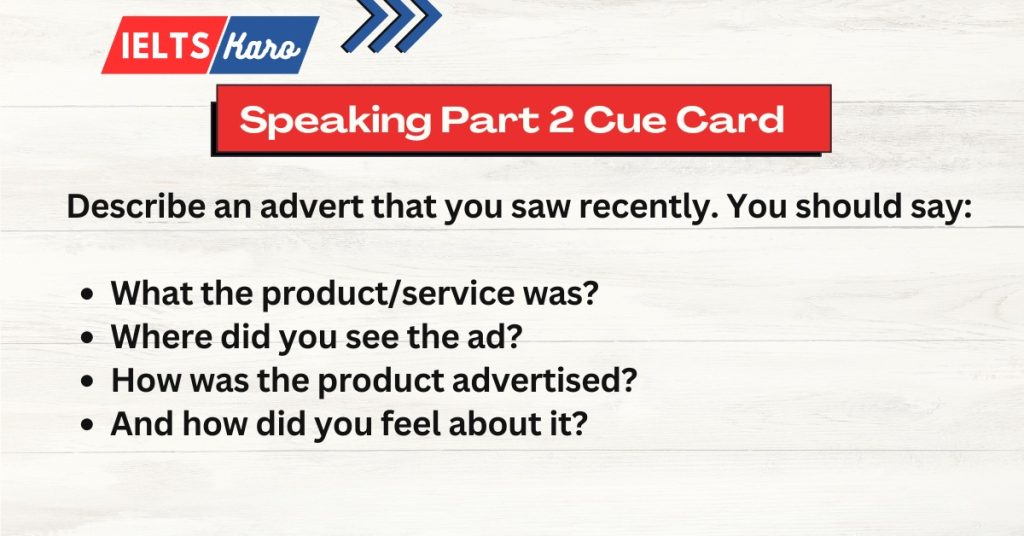
Describe an advert that you saw recently. You should say:
- What the product/service was?
- Where did you see the ad?
- How was the product advertised?
- And how did you feel about it?
I recently saw an advertisement for Lake City, which is a premium housing society located at Multan Road, Lahore. It is aimed at overseas Pakistanis who are accustomed to having a high standard of living, alongside locals who want to have a peaceful life.
I saw the ads on TV, billboards and digital media platforms like Instagram, Youtube and Facebook. The housing society has done a phenomenal job by hiring different celebrities in promoting their studio and 2-bedroom apartments. The ads are quite captivating in nature as they have made a new jingle and a brand new song that promotes peace, tranquillity, serenity and a top-notch living standard of the society.
The ads often show its lush green golf resorts, gardens, shopping malls, cinemas and 24/7 security. The best part is that all of the videos are of the actual residency, and not animated, unlike the ones shown by other societies.
Given the investment I have, I would definitely make a buying decision of a studio apartment without giving it a second thought. The society perfectly fits my needs such as great security, peaceful night walks and much more.
In short, the creative agency behind its marketing strategy has done a phenomenal job in portraying the best features of the society, rather than pushing people into buying the apartments. This is a great form of persuasive ads that I have seen in a long time by a housing society in Lahore.
How to Use Marketing and Advertising Vocabulary in IELTS Writing
Essay Writing Tips
When writing essays, incorporate by:
- Planning: Outline your essay and determine where to use specific terms.
- Variety: Use a range of vocabulary to avoid repetition.
- Context: Ensure the terms fit the context of your discussion.
How to Use Marketing and Advertising Vocabulary in IELTS Reading
Reading Comprehension Strategies
Improve reading comprehension by:
- Scanning for Keywords: Identify important advertising terms in the text.
- Context Clues: Use surrounding words to understand unfamiliar terms.
- Summarizing: Summarise paragraphs to grasp the main ideas.
Sample Passages and Questions
- Passage: “Recent studies indicate that there has been a marked increase in the number of ads seen by different brands online.”
- Question: “What does the research state about ads and marketing messages for different brands?”
How to Use Marketing and Advertising Vocabulary in IELTS Listening
Listening Comprehension Strategies
Enhance listening comprehension by:
- Active Listening: Focus on understanding the main points.
- Note-taking: Write down key terms and ideas.
- Practice: Listen to marketing-related podcasts and videos.
Practice Exercises
- Exercise: Listen to a lecture and summarise the key points.
- Exercise: Identify and define key terms used in a news report.
Improving Your Vocabulary
Daily Practice Techniques
- Flashcards: Create flashcards with marketing terms and definitions.
- Reading: Read marketing-related articles, books and blogs.
- Writing: Practise writing essays and sentences using new vocabulary.
Practical Applications of Advertising Vocabulary
In Real-Life Situations
Everyday conversations can enhance your communication skills and confidence by talking and discussing social media and billboard ads that you see on a daily basis.
In Academic and Professional Contexts
Advertising and marketing are studied in the academic and professional contexts in universities across the world.
Conclusion
Expanding your advertising vocabulary is vital for your IELTS preparation. The advertising terms and their meanings are not all, but at least I tried covering as many as I possibly can. Keep learning as much as you can too by reading marketing related blogs, articles, and academic books to gain your knowledge and improve vocabulary.
FAQs
What are some essential advertising vocabulary words for IELTS?
Essential words include “branding,” “buying power,” “social media marketing,” “online ads,” “email marketing,” “text messages,” “magazine ads,” “billboards,” and “TV commercials.”
How can I improve my vocabulary for the IELTS exam?
Improve your vocabulary by reading relevant materials, practising with flashcards, and writing essays on marketing topics. The best ways to improve your vocabulary is by reading books and watching Youtube videos on documentaries about marketing and advertising. You can also watch ads to improve your knowledge in a fun way.
Can using advertising vocabulary improve my IELTS score?
Yes, using a rich and accurate marketing vocabulary can improve your scores in the speaking and writing sections by demonstrating your language proficiency and ability to discuss complex topics.
What resources are best?
Recommended resources include online dictionaries, language learning apps like Duolingo, marketing-related articles, and IELTS preparation books.
How often should I practise for IELTS?
You should spend at least 1 hour on a daily basis by practising new words, improving your vocabulary and attempting one complete exam of a module.
Here are some external sources on marketing and advertising related vocabulary for IELTS:

